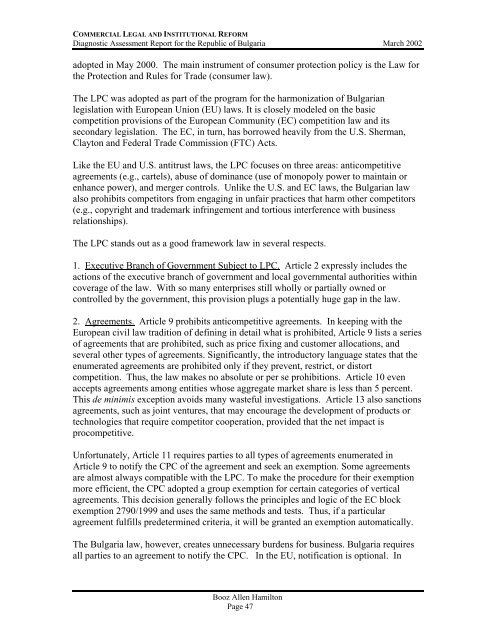Commercial Legal And Institutional Reform (CLIR) - Economic Growth
Commercial Legal And Institutional Reform (CLIR) - Economic Growth
Commercial Legal And Institutional Reform (CLIR) - Economic Growth
You also want an ePaper? Increase the reach of your titles
YUMPU automatically turns print PDFs into web optimized ePapers that Google loves.
COMMERCIAL LEGAL AND INSTITUTIONAL REFORM<br />
Diagnostic Assessment Report for the Republic of Bulgaria March 2002<br />
adopted in May 2000. The main instrument of consumer protection policy is the Law for<br />
the Protection and Rules for Trade (consumer law).<br />
The LPC was adopted as part of the program for the harmonization of Bulgarian<br />
legislation with European Union (EU) laws. It is closely modeled on the basic<br />
competition provisions of the European Community (EC) competition law and its<br />
secondary legislation. The EC, in turn, has borrowed heavily from the U.S. Sherman,<br />
Clayton and Federal Trade Commission (FTC) Acts.<br />
Like the EU and U.S. antitrust laws, the LPC focuses on three areas: anticompetitive<br />
agreements (e.g., cartels), abuse of dominance (use of monopoly power to maintain or<br />
enhance power), and merger controls. Unlike the U.S. and EC laws, the Bulgarian law<br />
also prohibits competitors from engaging in unfair practices that harm other competitors<br />
(e.g., copyright and trademark infringement and tortious interference with business<br />
relationships).<br />
The LPC stands out as a good framework law in several respects.<br />
1. Executive Branch of Government Subject to LPC. Article 2 expressly includes the<br />
actions of the executive branch of government and local governmental authorities within<br />
coverage of the law. With so many enterprises still wholly or partially owned or<br />
controlled by the government, this provision plugs a potentially huge gap in the law.<br />
2. Agreements. Article 9 prohibits anticompetitive agreements. In keeping with the<br />
European civil law tradition of defining in detail what is prohibited, Article 9 lists a series<br />
of agreements that are prohibited, such as price fixing and customer allocations, and<br />
several other types of agreements. Significantly, the introductory language states that the<br />
enumerated agreements are prohibited only if they prevent, restrict, or distort<br />
competition. Thus, the law makes no absolute or per se prohibitions. Article 10 even<br />
accepts agreements among entities whose aggregate market share is less than 5 percent.<br />
This de minimis exception avoids many wasteful investigations. Article 13 also sanctions<br />
agreements, such as joint ventures, that may encourage the development of products or<br />
technologies that require competitor cooperation, provided that the net impact is<br />
procompetitive.<br />
Unfortunately, Article 11 requires parties to all types of agreements enumerated in<br />
Article 9 to notify the CPC of the agreement and seek an exemption. Some agreements<br />
are almost always compatible with the LPC. To make the procedure for their exemption<br />
more efficient, the CPC adopted a group exemption for certain categories of vertical<br />
agreements. This decision generally follows the principles and logic of the EC block<br />
exemption 2790/1999 and uses the same methods and tests. Thus, if a particular<br />
agreement fulfills predetermined criteria, it will be granted an exemption automatically.<br />
The Bulgaria law, however, creates unnecessary burdens for business. Bulgaria requires<br />
all parties to an agreement to notify the CPC. In the EU, notification is optional. In<br />
Booz Allen Hamilton<br />
Page 47

















